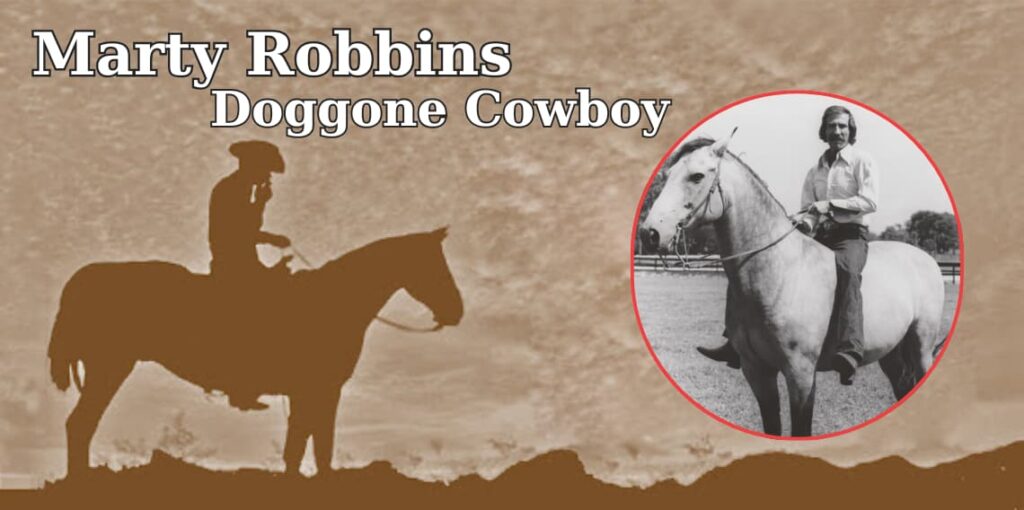
The Lone Rider’s Lament: A Cowboy’s Unwavering Spirit and the Open Range
Ah, if ever there was a voice that could transport you back to the dusty trails and wide-open spaces of the American West, it was that of Marty Robbins. And among his impressive catalog of timeless tales, one particular tune, “Doggone Cowboy,” stands out as a genuine gem, a testament to the enduring spirit of the cowboy and the solitary beauty of his life on the range. Released in December 1963 as part of the album “Return of the Gunfighter,” this song, while perhaps not reaching the towering heights of his chart-topping sensation “El Paso,” certainly contributed to the overall success of the album, which landed at a respectable No. 8 on Billboard’s newly established country album chart in early 1964, staying there for a solid 12 weeks. While “Doggone Cowboy” didn’t chart as a single on its own, its presence on such a well-received album speaks volumes about its quality and the role it played in cementing Robbins’s reputation as the quintessential singing cowboy.
For many of us who grew up with the sounds of country music echoing through our homes, Marty Robbins was more than just a singer; he was a storyteller, a balladeer who painted vivid pictures with his words and melodies. His unique ability to blend traditional country with a touch of pop, rockabilly, and, of course, the rich narratives of the Old West, made him a truly singular artist. “Doggone Cowboy” is a perfect example of this latter style, a narrative woven with threads of independence, resilience, and a touch of wistful longing.
The story behind “Doggone Cowboy” is deeply rooted in the mythology of the American West and the independent spirit that defined the cowboy’s existence. It’s a lyrical journey into the heart of a man who embraces the transient life of the open range, facing harsh elements and lonely nights with an unshakeable resolve. The lyrics, penned by J. Babcock, perfectly capture this essence: “I’m kin to the rovin’ wind that brings the norther in / Along that dusty trail I’ll take my stand.” This isn’t just a song; it’s a character study, a glimpse into the soul of someone who finds freedom and purpose in the relentless rhythm of cattle drives and campfire solitude.
The meaning of “Doggone Cowboy” resonates deeply with anyone who cherishes independence and a life lived on one’s own terms. It speaks of a profound connection to nature, an acceptance of hardship, and a contentment found not in material possessions or settled domesticity, but in the simple acts of herding cattle, throwing a rope, and dreaming of a distant love captured in a photograph. The repeated line, “I got no home, I got no wife, / But I’ll be a doggone cowboy all of my life,” encapsulates the unwavering dedication to this chosen path. It’s a statement of identity, a declaration of who he is and who he will always be, despite the lack of conventional comforts. The song acknowledges the harsh realities – the “big and bold” steers, the “cold” nights, the “hot dry wind” – but always circles back to the cowboy’s inherent ability to “get by.” It’s a narrative of self-sufficiency and an almost spiritual communion with the untamed landscape.
Listening to “Doggone Cowboy” today, it’s easy to be swept back to a time when life felt simpler, perhaps harder, but undoubtedly more aligned with the rhythms of the earth. Marty Robbins’s smooth, almost conversational delivery, combined with the classic Western instrumentation, evokes a powerful sense of nostalgia. You can almost feel the dust on your boots, smell the woodsmoke from the campfire, and hear the lowing of the cattle. This song, like so many of his Western ballads, tapped into a collective longing for a bygone era, a romanticized vision of the West that he, more than almost anyone else, brought to life through his music. It’s a reminder of a time when courage, resilience, and a strong, independent spirit were not just virtues, but necessities for survival. And in Marty Robbins’s voice, that spirit lives on, as vibrant and compelling as ever.